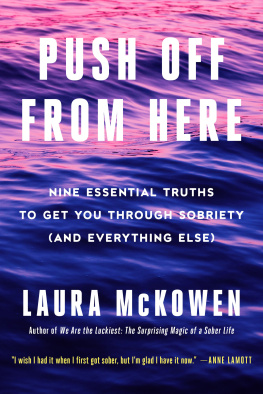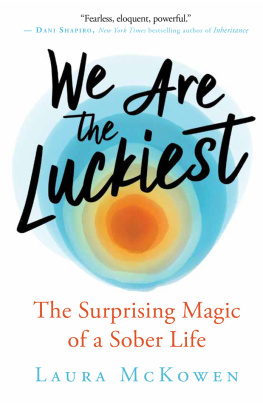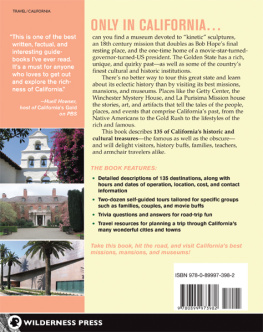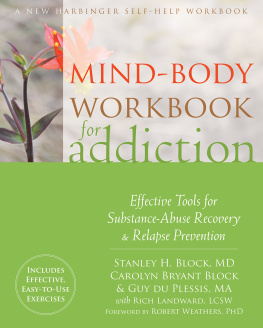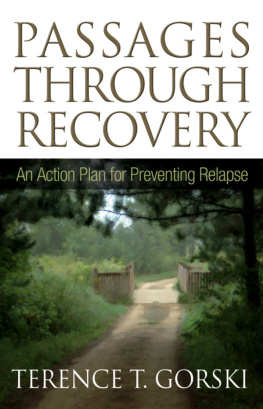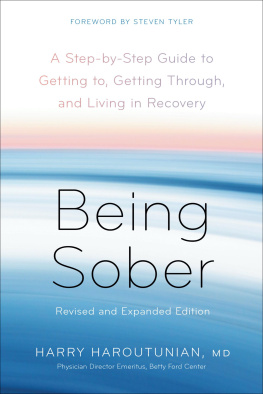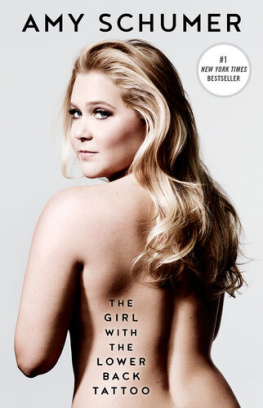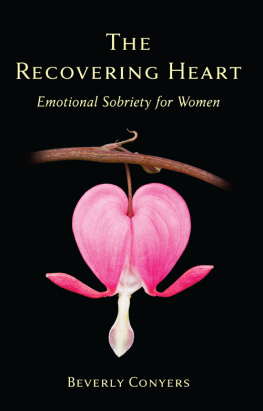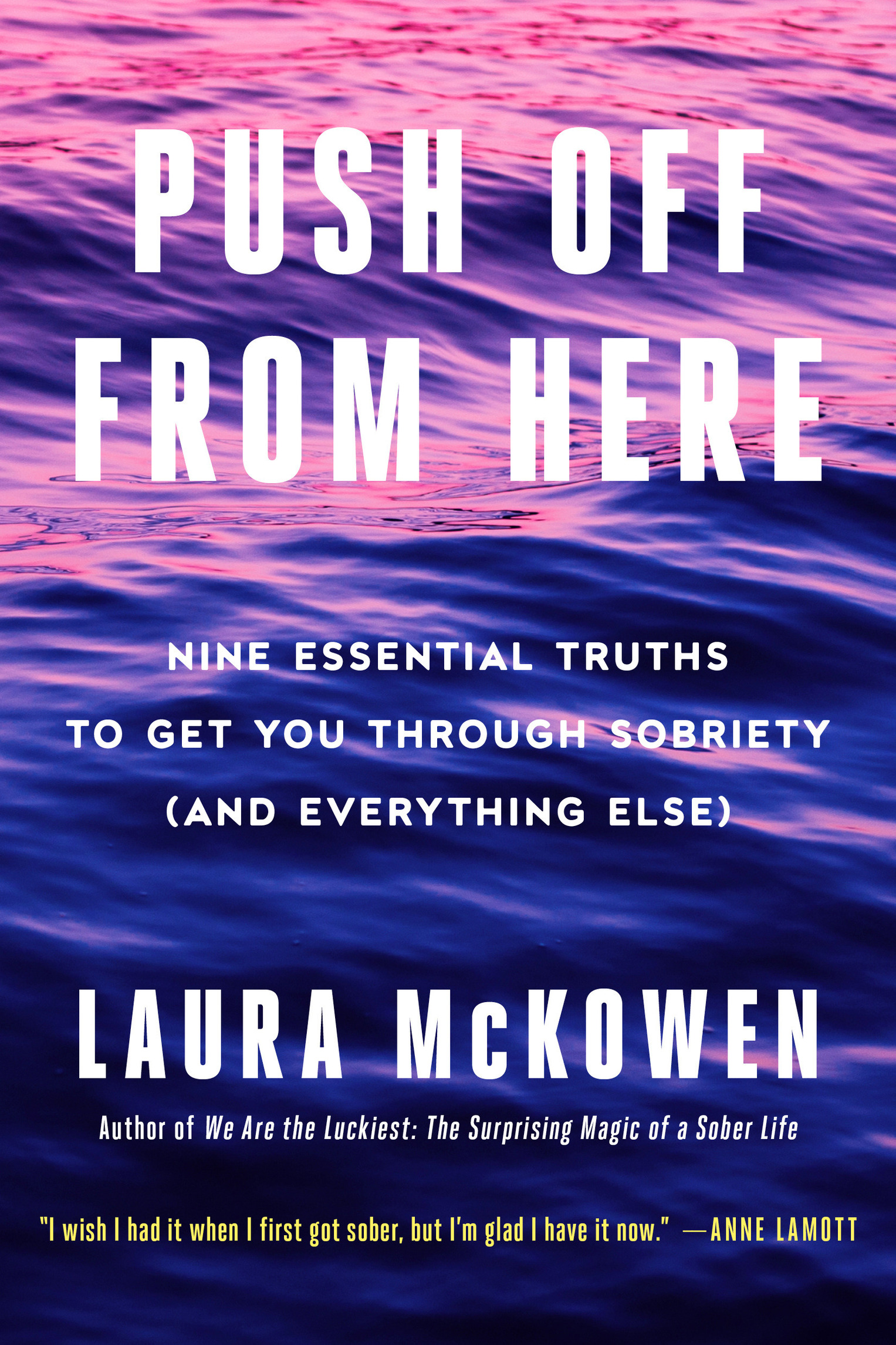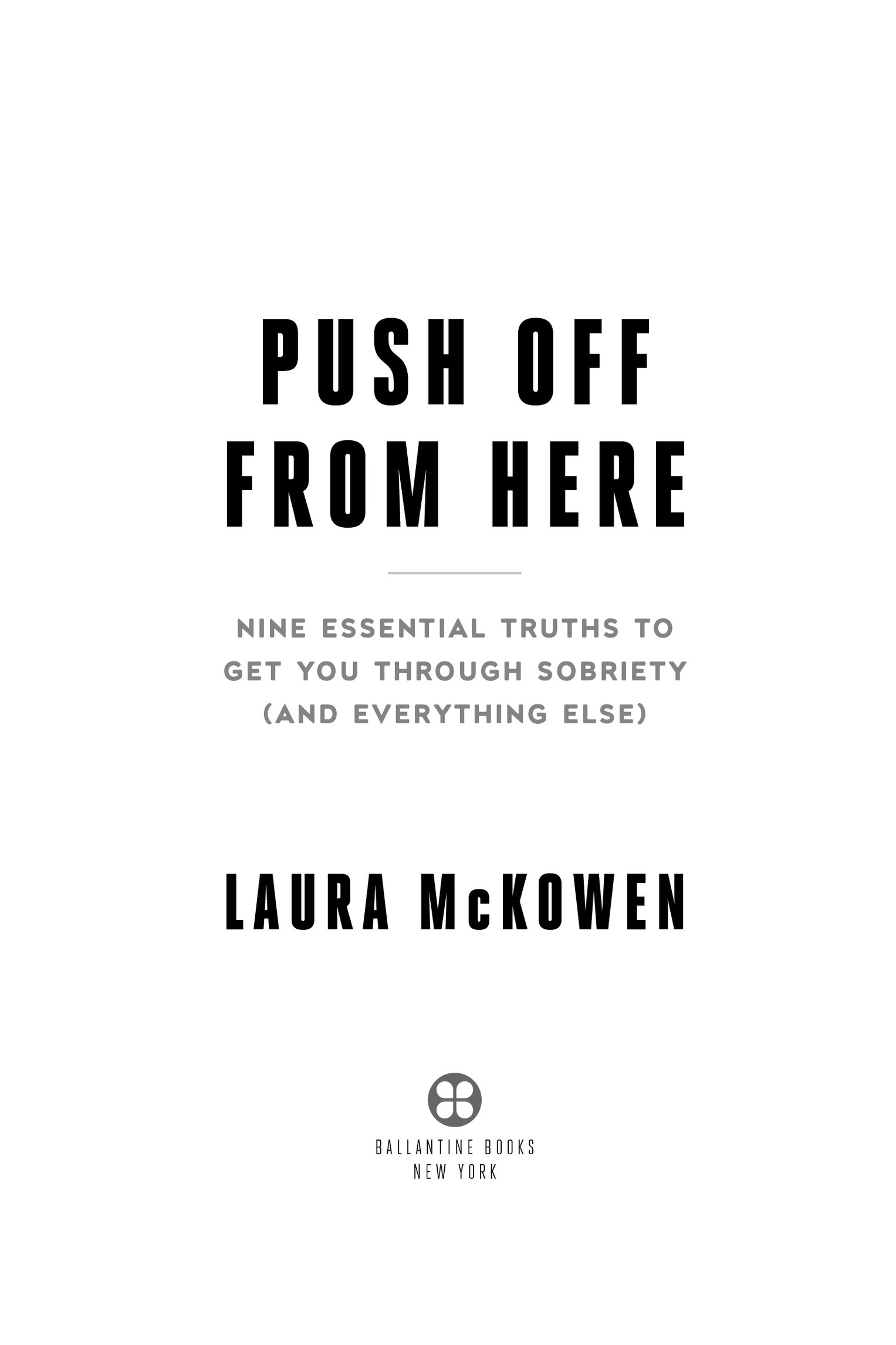Contents
Landmarks
Print Page List
Push Off from Here is a work of nonfiction. Nonetheless, some of the names and identifying details regarding individuals described have been changed in order to disguise those individuals. Any resulting resemblance to persons living or dead is entirely coincidental and unintentional.
Copyright 2023 by Laura McKowen
All rights reserved.
Published in the United States by Ballantine Books, an imprint of Random House, a division of Penguin Random House LLC, New York.
Ballantine is a registered trademark and the colophon is a trademark of Penguin Random House LLC.
The twelve questions on have been excerpted from material appearing on p. 36: Is A.A. for Me (aa.org), copyright by A.A.W.S. Inc. and in the pamphlet, Is A.A. for You?, and has been reprinted with permission of Alcoholics Anonymous World Services, Inc. (A.A.W.S.). Permission to reprint this material does not mean that A.A.W.S. has reviewed the authors material, affiliation and/or endorses this publication. A.A. is a program of recovery from alcoholism only use of A.A. material in any non-A.A. context does not imply otherwise.
Library of Congress Cataloging-in-Publication Data
Names: McKowen, Laura, author.
Title: Push off from here: nine essential truths to get you through
sobriety (and everything else) / Laura McKowen.
Description: New York: Ballantine Books, 2023. | Includes index.
Identifiers: LCCN 2022040146 (print) | LCCN 2022040147 (ebook) | ISBN 9780593498095 (hardcover) | ISBN 9780593498101 (ebook)
Subjects: LCSH: AlcoholicsRehabilitationUnited States. |
AlcoholismUnited StatesPsychological aspects.
Classification: LCC HV5292 .M35 2023 (print) | LCC HV5292 (ebook) | DDC 362.2920973dc23/eng/20221107
LC record available at https://lccn.loc.gov/2022040146
LC ebook record available at https://lccn.loc.gov/2022040147
Ebook ISBN9780593498101
randomhousebooks.com
Book design by Susan Turner, adapted for ebook
Cover design: Lucas Heinrich
Cover photograph: Getty Images/Mensent Photograph
ep_prh_6.0_142819847_c0_r0
Contents
INTRODUCTION
In 2016, I received an email from a woman whose sister was struggling with alcohol. The woman who wrote me had been going through the typical emotional meat grinder of loving someone caught in addiction: She was exhausted, heartbroken, frustrated, hopeful at times, and hopeless at others. Her sister had started pulling away and slipping into dark territory. She didnt know what to say, so she asked me: What would you have wanted to hear?
I was just shy of two years sober then. The woman contacted me because Id been sharing my battle with addiction and fight to get sober on a blog, a podcast, and through social media. I had somehow, and barely, climbed out from the dark place her sister was in. I wrote her a long response and at the end of my letter, I told her that if all of my words were too much, she could just use a list, my list. I wrote the nine most important things I had needed to hearfrom myself, from others, from what I understood to be Godwhen I was in the dark hell of my addiction. They were the things I still needed to hear daily in sobriety:
It is not your fault.
It is your responsibility.
It is unfair that this is your thing.
This is your thing.
This will never stop being your thing until you face it.
You cant do it alone.
Only you can do it.
I love you.
I will never stop reminding you of these things.
In the years that followed her letter, I found myself referring back to these nine things oftenIts not your fault / It is your responsibility / Its unfair that this is your thing / This is your thing; You cant do it alone / Only you can do itwhenever Id come up against something challenging: facing the massive debt I had accumulated, leaving my career in advertising and jumping into self-employment as a single mother, dealing with the trauma underneath my drinking, confronting the food and body issues that resurfaced in sobriety, and more. Whatever painful, hard thing came up, the nine things seemed to provide a touchpoint of wisdom, guidance, and reassurance. I know its odd to say my own words helped me, but its true (and anyway, I feel like they came through me rather than from me, as is often the experience with writing). When I published my sobriety memoir, We Are the Luckiest, in January 2020, I knew the nine things would be the epigraph.
After We Are the Luckiest came out, I immediately began to hear from readers who found solace in the nine things. I received screenshots, shares on social media, emails and letters, and artwork people had created, explaining how helpful they were in not only addressing the specific challenge of getting sober, but, as I had found, in facing all kinds of other things, too, from divorce and infertility to eating disorders and chronic pain.
A PANDEMIC-SPURRED EVOLUTION
The COVID-19 pandemic hit a few months after We Are the Luckiest came out. I was in the middle of traveling around the United States promoting the book when lockdowns began. I canceled my plans and watched alongside the rest of the world as all our institutions shut down: schools, airports, churches, banks, restaurants. Each of these closures seemed more surreal than the last, but I was shocked when I saw an email from my local Alcoholics Anonymous chapter announcing they would be closing the building until further notice. Id never seen this happen beforenot for New England blizzards, holidays, public emergenciesnever. Although I wasnt much involved with AA at that point, the availability and steadiness of meetings were still a comfort to me; any day of the week, there were multiple meetings available. It was a place I knew I could go, but also somewhere I could send others.
While I felt strong and supported in my own sobriety then, I thought of all the people who were newly sober or struggling and depended on those meetings to stay sober; those who would understandably relapse given this crisis and would have no place to go; those who would no doubt start drinking more heavily under the pressure of lockdowns and find themselves suffering alone. Of course, it wasnt only my local chapter of AA that closed downeverything was closing, everywhere. AA has millions of members worldwide who rely on those meetings to keep them sober, and for most folks, like me, sobriety is a matter of life and death. These were parents and children and siblings and teachers and healthcare workers and grandparents and caretakers and folks whom other people depended on every day.
Because Id already built a large community around sobriety through my writing in the years prior, I felt I could do something to help, at least until things returned to normal, which at that point we presumed would only be a matter of weeks. Without thinking about it too much, I decided one Saturday morning in mid-March to host a couple of free online sobriety support meetings over the weekend. I put together a simple sign-up page where people could register to be sent the Zoom information, announced it on social media, and broadcasted it to my newsletter list. I cobbled together a loose format based on what Id liked best about AA meetings: an opening statement about intention, a discussion topic or speaker, and then time for individual shares from the people attending (about their challenges, wins, and whatever else might be on their mind that day as it related to sobriety) with some guidelines. I also added my own elements: meditation, reading poetry or passages from books, and occasional feedback and commentary on shares. On Saturday, March 14, I hosted the first meeting.

